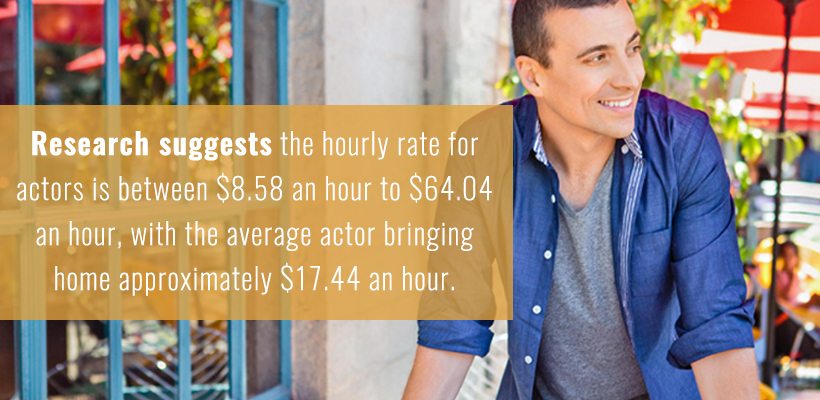Getting an Agent in Los Angeles: The Inside Information You Must Know
When you’re trying to get started as an actor in Los Angeles, it’s tempting to jump right in and sign with the first agent who expresses interest or who seems like they can get you the work you want. But not so fast. Take your time, and get prepared. Knowledge is powerful, and it will help you survive in this competitive city and cut-throat industry.
How Agents Help You Get Ahead in the Industry
Why is it so important to have an agent? With roughly 70,000 people in the United States working exclusively as actors, competition for coveted roles is fierce. You need someone in your corner, but who? And how can you ensure they’re working in your favor and not just for themselves? Understanding what to expect when looking for an agent can protect your pocketbook and your career.

Why You Need an Agent
Without an agent, you don’t have access to the plethora of acting jobs available in the city. Hollywood is a business, just like anything else. With buyers, sellers and products competing in the industry, you need to understand your place in this chain, what agents do and why they’re critical to your success. You’re at the bottom of the food chain, so to speak, and you need the expertise of an agent to guide you along.
Agents serve as the middleman between you and casting directors, and they pitch your skills to them in the hopes that the casting director will hire you. Your agent’s job is simply to find you work and to negotiate the contracts for that work.
Agents are an absolute must if you’re looking to make it in Hollywood. Not only can agents get you jobs, they can also open doors you would never have known existed. They help you build relationships and contacts and give you special advantages that are critical to success. Agents get jobs, jobs increase your status and increased status gets you more jobs.
The Cost of a Reputable Agent
You should never be required to pay any upfront fees to sign with an agent. Any paychecks you receive will go through your agent, and he or she will take a standard fee before passing the rest to you. Generally, agents will take 10% as their cut — but this is an unwritten rule, not an enforceable one. If you find you’re being charged more than that, you may reconsider doing business with this particular person.
Agents get this percentage because of the legwork they’re doing for you. They’re getting you the interviews, they’re taking care of paperwork and they’re making sure you get paid. This 10% is the only way agents get paid, and it’s worth the investment.
What Agents Require From You
If an agent asks you to attend a certain training class, use a specific photographer or sign up for a specific workshop, you have the right to say no. An agent can’t require you to do any of these things. If they make these kinds of requests, it probably means they’re getting a percentage of the fees back.
So now that you understand how an agent can benefit your acting career, let’s look at the steps you should take before you begin your agent search. You’re more likely to be successful if you’ve done the legwork that will help present you in the best light possible.
The Prep Work That Helps You Get Signed With an Agency

Before you start searching for an agent, get prepared. Expect to take 6-12 months to simply prepare yourself to contact agencies; expect another 6-12 months to meet with them. It’s not uncommon to take 1-2 years to be signed by a reputable talent agency. Below are some of the steps you can take to begin your journey.
1. Pay your dues.
If you’re brand-new to the industry, you don’t want to sign with an agent right away. If you’re going to get signed, you want to make sure it’s with a quality agent who can advance your career. Start by improving as an actor. Take lessons and classes. Make connections. Learn about the industry. Take an internship at a talent agency or become a reader at a casting office.
Networking is critical to your success, and, thankfully, it isn’t difficult. From meeting people in classes to socializing with other actors on set, there are plenty of opportunities to expand your professional horizon.
Doing these things is imperative, as new actors can’t come to L.A. expecting to be successful right away. Ensure you have a nest egg to help you survive during the lean times. It’s not easy to find a job that will support you financially and will also be flexible enough to let you be available for casting calls at a moment’s notice.
Even if you do acquire some acting jobs, don’t count on them to pay the bills. Research suggests the hourly rate for actors is between $8.58 an hour to $64.04 an hour, with the average actor bringing home approximately $17.44 an hour. Not quite a multimillion-dollar paycheck, but if you’re doing what you love, it just may be enough.

While you’re waiting for your big break, actively seek work on your own — from student films to low-budget movies and talent showcases. These productions are frequently casting and are looking for new actors who are willing to work in exchange for experience.
2. Prepare your sales pitch.
Agents want to sign talent who can make them money, pure and simple. When you walk into their office, they’re going to want to know how you will help them do that. Are you professional? Confident? Ready to work hard and make your way through the ranks? Let potential agents know your approach to the industry, and they’ll want you. With such a wide range of roles available and actors needed, there’s a project for everyone.
But if an agent is going to pitch you to a project team, they need to have confidence in you. They need to sell you to the project team, but they can do so only if they truly have something to sell.
3. Invest in high-quality headshots.
Your professional headshot can make or break you in this industry; don’t skimp and let it be the latter. Not only do acting headshots in Los Angeles need to be professional, they must also capture your personality while showing you in your best light — yes, that means professional retouching! These photos serve as a way for casting directors and others to get a quick look at your physical features to see if you match what they’re looking for.
Wait until you get to L.A. before you have your headshots done, as photographers there have a better understanding of what casting directors are looking for. Once you arrive, do your research to find a quality photographer who understands how to catch a casting director’s eye. Don’t look for the best value. Get recommendations, read reviews and ensure you’re hiring a trusted professional.
When getting your headshot done, wear simple clothes that aren’t distracting and that match the kind of acting you’re seeking. Be sure to wear everyday — that is, not excessive — makeup. Understand what “look” you’re going for and how to make yourself the most marketable. A professional will be able to guide you and offer suggestions for the best shot.
Also, ensure your photographer:
- Uses optimal lighting, which can make professional headshots stand head and shoulders above others.
- Specializes in headshots. That means knowing how to frame your face in pictures and emphasize your features. It also means working with someone who specializes in actor headshots. Every industry has different headshot expectations, and what works for a finance executive won’t work for an aspiring actor.
- Highlights your personality. Your pose is everything. Even when casting directors quickly glance at your headshot, your pose helps them get insight as to the kind of person you are.
- Uses a simple background, so the focus is on you.
- Includes your name and agency information somewhere on the prints.
It’s critical that the headshots match your current look. If you gain or lose weight, color your hair or change your style, have new headshots taken that reflect this. Casting agents expect your headshot to be a true and an accurate representation of you.
After your shots are taken, you’ll want to have them printed — generally 8” x 10” color prints — with your name and resume to the back. Make sure you have your headshots in order before you go out in search of an agent.
4. Pick reputable agents.
Many agents in Hollywood are defined solely by their client list. The longer and more impressive the list of clients they have, the greater the likelihood they are well-connected and well-respected.

But, if you’re new to the industry, scoring an agent like the one we described may be difficult at first. That doesn’t mean that the only good agents are those with a high volume of star power. In fact, agents eager to climb the ladder may be more likely to work harder for you so they can become a power player themselves. In Hollywood, you don’t necessarily need a top agent — you do need one who’s willing to go the extra mile for you.
Make sure you’re going through a legitimate agency. There are plenty of fakes and scams to be found in Los Angeles and the industry. One way of verifying the legitimacy of an agency is by making sure they’re SAG-AFTRA franchised. SAG-AFTRA, a combination of labor unions SAG (the Screen Actors Guild) and AFTRA (the American Federation of Television and Radio Artists) is committed to protecting media artists.
They currently represent more than 160,000 people and serve to negotiate working conditions and benefits, expand work opportunities and protect members’ work. Franchised agencies must submit proof to the union that they’re legitimate, giving you peace of mind as to whom you’re dealing with.
Some reputable agencies, however, aren’t franchised, and not all franchised agencies will be a good fit for you. It’s up to you to do your research — look at online reviews, personal recommendations and gut feelings — and select the best match for you. Find an agency that specializes in the area you want to focus on, whether that’s films, television or commercials.
You may have noticed we talk about Los Angeles and Hollywood and not New York or Miami. The reason is simple: If you want to succeed as an actor, you must be in the Los Angeles area. Although filming often occurs in other cities, casting doesn’t. It’s where the talent is and it’s where the agents and casting directors are. So, it’s where you need to be, too.
5. Prepare your marketing materials.
When you’re ready to approach agents, make sure you’re prepared with:
- Your headshot, which will make you stand out from the crowd and attract the agent’s attention.
- Your acting resume, which shows your depth and breadth of experience.
- A one-page cover letter that introduces and sells yourself.
Combine these items into a package and mail them — double-checking your spelling and addresses — to every union-franchised agency that accepts submissions by mail. There’s certainly no scarcity of agents in Los Angeles. Allow enough time to pass, seven to ten days, before contacting agencies by phone to request a face-to-face meeting.
Other ways of getting in touch with agents include online submissions, showcases and plays.
6. Prepare to impress at the first meeting.
When you do score that meeting, make sure you’re on time. Nothing shouts “unprofessional” more than showing up late. Bring additional copies of your package, just in case they’re needed.
Of course, agents want to know if you’ve got what it takes to become a legitimate actor. They may ask you to do a cold reading or ask you to recite something. Always have a reading ready.
Although you’ll have plenty of questions fired at you during the interview, this doesn’t mean you can’t also ask questions. In fact, asking questions shows you’ve done your research, are engaged in the interview and are committed to your career. Consider asking questions like:
- How many clients do you currently have, and what kind of projects have you booked for them?
- What do you expect of me as a client, and what should I expect from you?
- What type of actor do you see me as, and how would you facilitate my growth in the industry?
7. Deal with rejection.
As hard as it is to make it in Hollywood, it’s just as hard to find that first agent. You’re asking agents to take a risk on you. They need quality actors who book business in order for them to keep their doors open. Don’t be disappointed if you’re rejected. Many A-list stars have been.
Don’t take the rejection personally. You may be rejected because you don’t yet have enough experience or because the agency already represents enough clients with your “look.”
Take rejection professionally, and learn from it. With myriad agencies to select from, take your newfound knowledge and improve your resume, your monologue and your skills. With time, you’ll find the right fit.
Agents must believe in you, but, first, you must believe in yourself.
Ready to Make a Smart Move?
When you’re ready for the professional actor headshot in Los Angeles that will make industry executives sit up and pay attention, contact us. We’ll talk about your needs and expectations and set up a time to make magic happen. Whether you’re looking for actor headshots, theatrical headshots, modeling portfolios or more, Michael Roud Photography has the expertise and industry experience to offer you the best photography for your needs.






